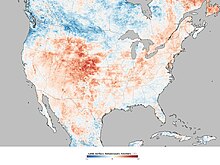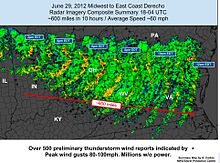2012 North American heat wave
This article is about a current disaster where information can change quickly or be unreliable. The latest page updates may not reflect the most up-to-date information. |

The Summer 2012 North American heat wave is a heat wave which has led to more than 43 heat-related deaths across the United States and Canada.[1][2] An additional twenty-two lives were lost in the resultant June 2012 North American derecho. As of July 6, over 500,000 are still without power as the heat wave continues.[3]
Weather
The heat spread east from the Rocky Mountains and a massive high-pressure system over the Midwest caused triple-digit temperatures.[4] On June 25, 2012, Denver, Colorado tied its all-time high with a temperature of 105°F (40.5°C). On the same day a couple of 113°F (45°C) readings were recorded in Kansas. The heat was so strong that Alamosa, Colorado broke their daily records for six consecutive days. In Galveston, Texas, the earliest 100°F day ever was recorded.[5]
In Northern Canada, Fort Good Hope, Northwest Territories had a streak of five consecutive days above 30°C (86°F) from June 21 to June 25, quite possibly the longest heat wave in Canada at that moment.[6] Further south, on June 19, 20 and 21, Toronto experienced its first official heat wave of the season (a heat wave in Toronto is defined as three or more consecutive days with temperatures at or above 32°C (90°F), with temperatures ranging between 33.4°C (92.1°F) and 34.5°C (94.1°F) and the minimum temperature on June 20 not dropping below 24.4°C (75.9°F).[7] On July 4, Toronto reached 36.3°C (97.3°F)[8] and similar conditions are predicted for Friday, July 6.
Hill City, Kansas was the warmest point in the United States on June 26 with the thermometer climbing to 115°F (46.1°C).[9]
Thousands of records were being broken again on June 28. Fort Wayne, Indiana tied its all-time record high with 106°F (41.1°C) while Indianapolis broke its monthly record at 104°F(40°C). More monthly records that day included St. Louis, Missouri at 108°F (42.2°C) and Little Rock, Arkansas at 107°F (41.7°C).[10] Wildfires raged across the western United States. The Waldo Canyon fire in Colorado attracted the most attention after spreading into Colorado Springs and charring hundreds of homes, but large wildfires also burned throughout Utah, Wyoming, Montana, New Mexico, Utah, and Arizona.[11] Two boys from Bradley County, Tennessee died of hyperthermia.[12]
The scorching heat continued on June 29 when Washington, D.C. and Atlanta, Georgia recorded their highest June temperature ever at 104°F(40°C). Charlotte, North Carolina and Raleigh, North Carolina were warm enough to tie the all-time record at 104°F(40°C) and 105°C(40.6°C) respectively.[13]

On June 29-30, 2012, The heat and humidity from the heat wave caused a small thunderstorm in Iowa to develop into a violent and unprecedented derecho, which tracked across the Midwest and Mid-Atlantic regions of the United States while causing 80 MPH or higher winds, doing hundreds of millions of dollars in damage, and downing trees and power lines, leaving 4 million people in the eastern U. S. without power.[14]
Chicago's O'Hare International Airport tied its all-time 4th of July record of 102°F (38.89°C) which was set back in 1912. Not far from O'Hare, the official measuring station for the city of Chicago, the villages of Park Ridge, Niles, Norridge as well as much of the Chicago metropolitan area recorded a temperature of 104°F (40°F). Some places north of Chicago got even hotter. Caledonia, Wisconsin, just south of Milwaukee, Wisconsin reached 107°F. Actual air temperatures were close to 110°F in and around the city of Allegan, Michigan. St. Louis, Missouri has endured a string of 8 days with temperatures above 100 °F, and this is forecast to continue until July 7.[15] Three deaths in St. Louis have been attributed to the heat.[16]
As of July 6, Chicago has had 4 official 100 °F (38 °C) or higher temperature readings, with an official high of 103 °F (39 °C) at O'Hare on the 5th. Like the day before, temperatures were much higher in Park Ridge and in much of the metropolitan area of Chicago, with highs reaching 105 °F (40.6 °C) and 106 °F (41.1 °C) in some areas. These temperatures are extremely unusual for the city and the surrounding area. Normally, the highest temperature recorded on a typical Chicago summer is around 95 °F (35 °C), a temperature of 90 °F (32 °C) is usually considered extreme, and the thermometer reaches or surpasses 100 °F (38 °C) only once every 5 to 10 years. The Chicago temperatures exceeded the 1995 Chicago heat wave, which claimed over 750 lives.[17] Through the first five days of July, temperatures in Chicago averaged 86.4 °F (30.2 °C), 13.2 °F (7 °C) above normal, the hottest since 1911.[18] Two deaths are confirmed so far from the heat in Cook County, and two other lives were lost in a train derailment blamed on the heat.[19] An additional death in Rock County, Wisconsin has been noted.[20]
Maryland has been particularly hard-hit, with eight deaths so far, including four on July 5.[21] The heat wave is expected to get worse as humid conditions in the Eastern United States may contribute to extreme heat indices.[3]
There’s a high level of agreement among scientists that global warming has made it more likely that heat waves of this magnitude will occur.[11]
References
- ^ "Dozens of deaths tied to heat wave over last 2 weeks - U.S. News". Usnews.msnbc.msn.com. 2012-06-30. Retrieved 2012-07-07.
- ^ Bruce Schreiner, Roxana Hegeman And Seth Borenstein (2012-06-28). "Nation bakes as serious heat wave hits early - Yahoo! News". News.yahoo.com. Retrieved 2012-07-07.
- ^ a b "Over 115 million bake in heat, with more scorching temps to come". CNN.com. Retrieved 2012-07-07.
- ^ Murphy, Kevin (2012-06-28). "Extreme heat spreads across U.S., breaks records - Yahoo! News". News.yahoo.com. Retrieved 2012-07-07.
- ^ "All-Time Record Highs Fall in Colorado, Kansas, Nebraska". Accuweather.com. Retrieved 2012-07-07.
- ^ "Daily Data | Canada's National Climate Archive". Climate.weatheroffice.gc.ca. 2012-05-29. Retrieved 2012-07-07.
- ^ "Daily Data | Canada's National Climate Archive". Climate.weatheroffice.gc.ca. 2012-05-29. Retrieved 2012-07-07.
- ^ "Daily Data | Canada's National Climate Archive". Climate.weatheroffice.gc.ca. 2012-05-29. Retrieved 2012-07-07.
- ^ "Hill City high temperature hits 115 again Wednesday". KansasCity.com. 2012-06-27. Retrieved 2012-07-07.
- ^ "STORM2K • View topic - RECORD HIGHS JUNE 2012". Storm2k.org. Retrieved 2012-07-07.
- ^ a b "NASA - NASA Maps Heat Wave Fueling Wildfires in the Rockies". Nasa.gov. Retrieved 2012-07-07.
- ^ "Heat Caused Death Of Two Young Boys In Bradley County - 07/06/2012". Chattanoogan.com. 2012-06-07. Retrieved 2012-07-07.
- ^ Samenow, Jason (2012-06-29). "Washington, D.C. shatters all-time June record high, sizzles to 104 - Capital Weather Gang". The Washington Post. Retrieved 2012-07-07.
- ^ "East Coast storms kill 13, cause wide power outages". Newsday.com. Retrieved 2012-07-07.
- ^ "Streak of 100-degree weather in St. Louis area hits five days". Stltoday.com. 2012-07-03. Retrieved 2012-07-07.
- ^ "Midwest Can't Get Any Relief from Oppressive Heat". weather.com. Retrieved 2012-07-07.
- ^ July 6, 2012 7:36 AM. "Tim's Weather World: Is this heat wave Chicago's worst - Chicago Weather Center". Blog.chicagoweathercenter.com. Retrieved 2012-07-07.
{{cite web}}: CS1 maint: numeric names: authors list (link) - ^ July 6, 2012 3:02 AM. "Oppressive heat spills into Friday with the hottest temps since Chicago's deadly July 12-16, 1995 heat wave 17 years ago - Chicago Weather Center". Blog.chicagoweathercenter.com. Retrieved 2012-07-07.
{{cite web}}: CS1 maint: numeric names: authors list (link) - ^ "Intense heat in Chicago a factor in two deaths, many disruptions". Chicagotribune.com. Retrieved 2012-07-07.
- ^ "Heat related death noted in Rock County - Beloit Daily News: Home". Beloit Daily News. Retrieved 2012-07-07.
- ^ "Update: Heat-Related Deaths Rise To 9 In Md". wusa9.com. Retrieved 2012-07-07.
External links
- Scorching Heat Roasts Eastern U.S. July 3, 2012 Scientific American
